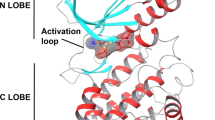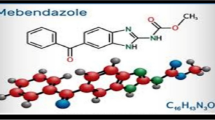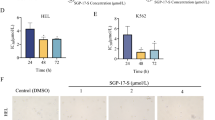Abstract
Objective
To study the inhibitory effect of oridonin on the growth of cancer cells.
Methods
Fifteen human cancer cell lines were subjected to various concentrations of oridonin in culture medium. The inhibitory rate of cell growth was measured by the MTT assay, and compared with a negative control and 5-Fu-positive control.
Results
The 50% inhibiting concentration (IC50) and maximal inhibition (Imax) of oridonin shown by studying the growth of the cancer cell lines were as follows: leukemias (HL60 cells: 3.9 μg/ml and 73.8%, K562 cells: 4.3 μg/ml and 76.2%); esophageal cancers(SHEEC cells: 15.4 μg/ml and 99.2%, Eca109 cells: 15.1 μg/ml and 84.6%, TE1 cells: 4.0 μg/ml and 70.2%); gastric cancers (BGC823 cells: 7.6 μg/ml and 98.7%, SGC7901 cells: 12.3 μg/ml and 85.7%); colon cancers (HT29 cells: 13.6 μg/ml and 97.2%, HCT cells: 14.5 μg/ml and 96.5%); liver cancers (Bel7402 cells: 15.2 μg/ml and 89.2%, HepG2 cells: 7.1 μg/ml and 88.3%); pancreatic cancer (PC3 cells: 11.3 μg/ml and 68.4%); lung cancer (A549 cells: 18.6 μg/ml and 98.0%); breast cancer (MCF7 cells: 18.4 μg/ml and 84.7%); uterine cervix cancer (Hela cells: 13.7 μg/ml and 98.5%).
Conclusion
Oridonin had a relatively wide anti-tumor spectrum, and a relatively strong inhibitory effect on the growth of the 15 human cancer cells. Inhibitory effects were concentration dependent.
Similar content being viewed by others
References
The Pharmacology and Medicinal Chemistry Group of Henan Institute of Medical Sciences. A new anti-tumorigenic substance-rubescensin. Chin Sci Bull. 1978;23:53–56 (Chinese).
Fan HY, Sun HD, Huang JH, et al. Studies on the chemistry of Rubescensine B. J Henan Medical College 1979;14:14–16 (Chinese).
Sun HD, Chao JH, Lin ZW, et al. The structure of rubescensine C. Chem Pharm Bull 1982;30:341–343.
Sun HD, Zhao QZ, Fujita T, et al. The structure of rubescensin D. Phgtochemistry 1992;31:1418–1419.
Lin CJ, Zhao ZH. Studies on structure of rubescensine E. Chin J Chin Materia Medica. 1997;22:612–613 (Chinese).
Feng CW, Pan XL, Guo JH, et al. Study on inhibition of human HL-60 cells by oridonin. J Zhejiang College of TCM. 2000;24:47–48 (Chinese).
Liu JJ, Wu XY, Lu HL, et al. Antiproliferation effect of oridonin on HL-60 cells and its mechanism. Chin Med Sci J 2004;19:134–137.
Li RF, Wang QD. Regulation of telomerase activity and cell cycle by oridonin in K562 cells. Henan J Oncol 2004;17:305–307 (Chinese).
Liu JJ, Huang RW, Lin DJ, et al. Oridonin-induced apoptosis in leukemia K562 cells and its mechanism. Neoplasma 2005;52:225–230.
Liu JJ, Huang RW, Lin DJ, et al. Antiproliferation effect of oridonin on HPB-ALL cells and its mechanisms of action. Am J Hematol 2006;81:86–94.
Ikezoe T, Chen SS, Tong XJ, et al. Oridonin induces growth inhibition and apoptosis of a variety of human cancer cells. Int J Oncol 2003;23:1187–1193.
Ikezoe T, Yang Y, Bandobashi K, et al. Oridonin, a diterpen-oid purified from Rabdosia rubescens, inhibits the proliferation of cells from lymphoid malignancies in association with blockade of the NF-KB signal pathways. Mol Cancer Ther 2005;4:578–586.
Li XT, Lin C, Li PY, et al. Comparative study on the sensitivities of seven human cancer cell lines to rubescensine A. Acta Pharmaceutica Sinica. 1985;20:243–246 (Chinese).
Zhang JF, Liu JJ, Liu PQ, et al. Oridonin inhibits cell growth by induction of apoptosis on human hepatocelluar carcinoma BEL-7402 cells. Hepatol Res 2006;35:104–110.
Xiao DJ, Zhu GC, Wang XL, et al. Study of the cytotoxic effect of hypericum japonicum thunb and oridonin on the human nasopharyngeal carcinoma cell line CNE. J Qiqihaer Medical College 2005;26:1396–1397 (Chinese).
Liu JJ, Huang RW, Lin DJ, et al. Antiproliferative effects of oridonin on SPC-A-1 cells and its mechanism of action. J Int Med Res 2004;32:617–625.
Zhang CL, Wu LJ, Tashiro SI, et al. Oridonin induces A375-S2 cell apoptosis via BAX-regulated caspase pathway activation dependent on the cytochrome C/Capase-9 apoptosome. J Asian Nat Prod Res 2004;6:127–138.
Chen S, Gao J, Halicka H D, et al. The cytostatic and cytotoxic effects of oridonin (rubescenin), a diterpenoid from Rabdosia rubescens, on tumor cells of different lineage. Int J Oncol 2005;26:579–588.
Cui Q, Tashiro SI, Onodera S, et al. Augmentation of orido-nin induced apoptosis observed with reduced autophagy. J Pharmacol Sci 2006;101:230–239.
Wang RL, Fan KS, Zhao GX, et al. Clinical studies of oridonin on therapy the malignant tumor. Papers on antitumor studies of Rabdosia rubescens. 1990,8–21 (Chinese).
Zhang TM, Wang MY, Lin C. The effect of oridonin on the cytokinetic of ECA cells. J Henan Medical College. 1982;17:7–12 (Chinese).
Wang MY, Lin C, Zhang TM. Cytokinetic effects of oridonin on leukemia L1210 cells. Acta Pharmacol Sin 1985;6:195–197.
Wang MY, Lin C, Zhang TM. Effects of oridonin on DNA RNA and protein syntheses of leukemia 1210 cells studied by autoradiography. Acta Pharmacol Sin 1987;8:164–165.
Author information
Authors and Affiliations
Corresponding author
Additional information
This work was supported by the grant form the Guangdong Science and Technology Department (No. 2006B35630009).
About this article
Cite this article
Chen, J., Wang, S., Chen, D. et al. The inhibitory effect of oridonin on the growth of fifteen human cancer cell lines. Chin. J. Clin. Oncol. 4, 16–20 (2007). https://doi.org/10.1007/s11805-007-0016-9
Received:
Accepted:
Issue Date:
DOI: https://doi.org/10.1007/s11805-007-0016-9




